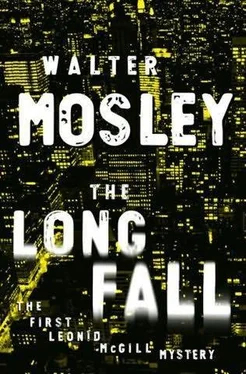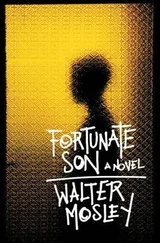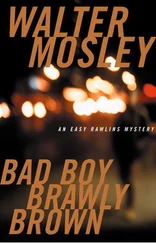Walter Mosley - The Long Fall
Здесь есть возможность читать онлайн «Walter Mosley - The Long Fall» весь текст электронной книги совершенно бесплатно (целиком полную версию без сокращений). В некоторых случаях можно слушать аудио, скачать через торрент в формате fb2 и присутствует краткое содержание. Жанр: Старинная литература, на русском языке. Описание произведения, (предисловие) а так же отзывы посетителей доступны на портале библиотеки ЛибКат.
- Название:The Long Fall
- Автор:
- Жанр:
- Год:неизвестен
- ISBN:нет данных
- Рейтинг книги:3 / 5. Голосов: 1
-
Избранное:Добавить в избранное
- Отзывы:
-
Ваша оценка:
- 60
- 1
- 2
- 3
- 4
- 5
The Long Fall: краткое содержание, описание и аннотация
Предлагаем к чтению аннотацию, описание, краткое содержание или предисловие (зависит от того, что написал сам автор книги «The Long Fall»). Если вы не нашли необходимую информацию о книге — напишите в комментариях, мы постараемся отыскать её.
The Long Fall — читать онлайн бесплатно полную книгу (весь текст) целиком
Ниже представлен текст книги, разбитый по страницам. Система сохранения места последней прочитанной страницы, позволяет с удобством читать онлайн бесплатно книгу «The Long Fall», без необходимости каждый раз заново искать на чём Вы остановились. Поставьте закладку, и сможете в любой момент перейти на страницу, на которой закончили чтение.
Интервал:
Закладка:
“We could turn it in ourselves,” Bill offered then. “Just walk into One Police Plaza and say, ‘Hey, look what we found.’ ”
“And we’d be their bitches from then on. Anytime we said no they’d threaten to turn us out.”
Our talks always started out like that. Bill had a good mind but he was lazy. He didn’t see our job as a craft, more like a pickup pool hustle, where there was always a chance that you could lose. Luckily he deferred to me when it came to finalizing a plan, so we went on with our museum excursion.
After getting our fill of culture we settled into the restaurant bar for espressos and biscotti. I brought up a friend of Bill’s who worked for Tyner. The man’s name was Sharp. Sharp was in debt to a bookie who wasn’t afraid of Tyner. Tyner didn’t like his people gambling and would have come down hard on Sharp if he heard about it. Sharp was also well acquainted with Tyner’s accountant, a man named Norman Bly. Bly had a girlfriend, Mae Lynn, who managed to look like Jayne Mansfield while not being much older than Shirley Temple—when Temple was singing “On the Good Ship Lollipop.”
The plan followed nature, which was always the best way to go. Why blast a path down a mountain when erosion has already excavated the best route?
First we would take some incriminating pictures of Bly and Mae Lynn, then we would go to Sharp and offer him the cash he needed to call off the leg-breakers; all he’d have to do was put a few papers in Bly’s briefcase on a certain day. We’d pretend that the papers were only there to incriminate Bly.
Now it made sense to go to the organized crime unit. We’d have a delivery service haëverem"nd over the pictures and Mae Lynn’s father’s address. That very afternoon Bly and Lynn were going to meet in a midtown hotel managed by Tyner’s real estate company. We didn’t have to worry about the cops ignoring our delivery. They’d be happy to pass around pictures of a mature fourteen-year-old and old fat Norman.
It worked beautifully. The cops busted the couple in the nude. They confiscated the briefcase and found the numbers connecting Tyner to the extortion scheme. They offered Bly a deal that he couldn’t refuse and Tyner went to prison.
It all went exactly as planned . . . but there was a problem.
Bill let his college certificate get him in trouble. Since he was better educated than all of his hoodlum friends, he thought he was smarter—than anyone. So he figured if we were getting fifteen thousand out of Marr, then Tyner would pay double. He went to a guy named KC Longerman to pass the plan (without our names attached to it) along to Tyner. But somewhere in Bill’s education he skipped the course that would’ve told him I was the one who introduced him to KC.
I went to Bill’s place, with murder in mind, the night after we put the plan in motion. Norman Bly was in police custody and Joe Tyner was soon to be a guest of the state. As far as I was concerned, this was also Bill’s last night of life.
His plan wouldn’t have worked. Tyner could have easily found out who Four-fingers had contracted with. But Bill thought he was too slick. He didn’t mean to get us killed.
I was so angry that murder was only a twitch away. But as I stood over him I realized that Bill’s betrayal was my fault. Men like Bill and me should never have been partners, not in the long-term straight-world way of contracts and agreements. We weren’t businessmen. We were independent agents out for ourselves by necessity, and by nature. Bill didn’t see any problem with getting a little on the side. As long as I didn’t know and wasn’t hurt, what did I have to complain about?
I left his apartment door ajar, with a hollow-point .45-caliber bullet standing like a soldier on his breakfast table.
We haven’t crossed paths since.
I REMEMBERED BILL because even though I have eschewed partnership since that time, I am still, as Harris Vartan noted, not completely self-sufficient. With the police knocking on my door, dead men in my wake, and killers studying my name, I knew that I had to get my butt in gear and head way downtown, where the laws of nature and the laws of man intersect, intertwine, and make up a whole new system of justice.
Ê€„
29
In spite of my sporadic fantasies about foreign climes, the only city I could live in is New York. Most other American municipalities are segregated by class and culture, education and personal choice. But in New York everybody is jumbled up together and bounced around until you have African princes walking side by side with Appalachian Daughters of the American Revolution, and aspiring starlets îp tmaking room for hopeful housewives past their prime. Even with real estate costs climbing above the reach of almost everyone, you can still find all the elements of humanity riding the number 1 train down under the West Side of Manhattan.
There were at least a dozen readers in the car I rode on the trek toward Wall Street. They perused novels and textbooks, newspapers and hip-hop magazines. There were displaced housewives going to work because one income didn’t pay the rent anymore. Many of these watched their soaps on tiny screens plugged into earphones. That afternoon I saw books by Thomas Mann, Joy King, Edwidge Danticat, and Danielle Steel being read. One dusty fellow kept turning his head suspiciously, looking for enemies that might be sneaking up on him. A chubby white woman smiled at me and even pursed her lips. At one point a troupe of doo-wop singers composed of one Asian and three blacks made their way through our car, crooning “On Broadway” and “Up on the Roof.”
There were two middle-aged women sitting across from me, one black and the other white. They were laughing and chatting happily about work. It seemed that a supervisor who had been leaning on them had an affair with a secretary who was also fooling around with the big boss.
“Honey, when he came out of Metcalf’s office he was white as marshmallows,” the black woman was saying.
She was having such a good time that she didn’t notice the little guy in the unremarkable clothes sitting next to her on the bench. He wore tan trousers and a navy shirt. His once completely yellow head of hair now was layered with differing shades of dirty gray. His back was almost fully turned to the black woman but somehow Regular Joe’s elbow had jostled her big blue purse so that it fell partly open.
The next step would have been for him to get up when the train came close to a stop. That way, when the brakes were applied, he could pretend to fall off balance and make a fast grab. People in his profession had good hand-eye coordination and great dexterity.
Maybe fifteen seconds before the process was to begin I coughed. In the pickpocket’s ear I might as well have yelled, “Stop thief!”
He looked up at me and I shook my head ever so slightly.
He smiled and nodded, got to his feet, and moved on down the line.
“Ma’am,” I called across the aisle.
“What?” the chatty black woman said in a markedly unfriendly tone.
“Your bag is open.”
Her reaction was completely predictable. First she grabbed her purse and searched it. A red wallet floated near the top. But there was also her cell phone and MP3 player to check out. She cinched the bag shut and glared at me for a second and a half, wondering if somehow I had tricked her. The defiant stare then melted into contrition and she finally, reluctantly, said, “Thank you,” as if I were a mischievous child who just pointed out that her underwear was showing.
THE ARCHITECTURAL EQUIVALENT of the nondescript pickpocket was a gray-walled building a few blocks north of where the World Trade Center used to stand. There were no guards or doormen in the lobby, and the man I was looking for didn’t have his name or title on the sparse directory.
Читать дальшеИнтервал:
Закладка:
Похожие книги на «The Long Fall»
Представляем Вашему вниманию похожие книги на «The Long Fall» списком для выбора. Мы отобрали схожую по названию и смыслу литературу в надежде предоставить читателям больше вариантов отыскать новые, интересные, ещё непрочитанные произведения.
Обсуждение, отзывы о книге «The Long Fall» и просто собственные мнения читателей. Оставьте ваши комментарии, напишите, что Вы думаете о произведении, его смысле или главных героях. Укажите что конкретно понравилось, а что нет, и почему Вы так считаете.












